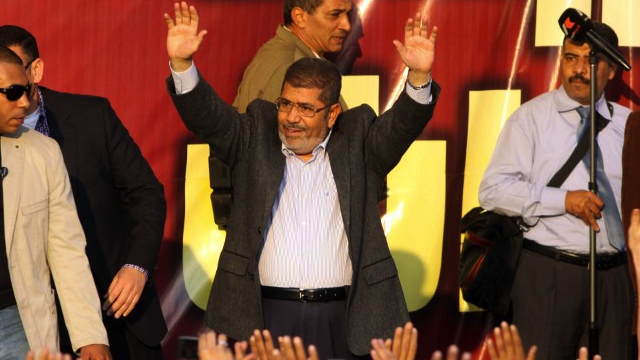SUMMARY
This is AI generated summarization, which may have errors. For context, always refer to the full article.

CAIRO, Egypt – Egypt’s President Mohamed Morsi on Monday, November 26, stuck by a controversial decree granting him sweeping powers, on the eve of planned nationwide rallies to protest the move, in the worst crisis since his election in June.
There is “no change to the constitutional declaration,” presidential spokesman Yasser Ali told reporters, after a meeting between Morsi and the country’s top judges aimed at defusing the dispute.
During the meeting, the judges expressed concern about Thursday’s constitutional declaration which allows Morsi to issue any law or decision unchallenged by the courts, Ali said.
But he added that Morsi sought to clarify that any irrevocable decisions apply only to issues related “to his sovereign powers” and stressed the temporary nature of the decree.
A judicial source told AFP that even if immunity were limited to sovereign powers, “which appears to be a compromise, there are still concerns that the text itself remains unchanged.”
The crunch talks came on the eve of planned protests by rival forces, although the Muslim Brotherhood party from which the president hails withdrew its call for a rally out of fears that it would spark more clashes.
A court will next week examine the legality of the decree by which Morsi assumed broad new powers on Thursday, an official said, as demonstrators opposed to the Islamist leader staged a sit-in at Cairo’s iconic Tahrir Square.
Hundreds of mourners turned out, meanwhile, for the burial of a member of the president’s party who was killed on Sunday in violence outside its offices in the Nile Delta town of Damanhour.
Angry demonstrators have also torched offices belonging to the Muslim Brotherhood’s Freedom and Justice Party (FJP).
In Cairo, thousands marched at the funeral of Gaber Salah, a member of the April 6 movement who died last week from injuries suffered in clashes near Tahrir Square.
The movement is one of the pro-democracy groups that called for last year’s uprising the toppled the regime of longtime dictator Hosni Mubarak.
Morsi’s decree led to charges that he is taking on dictatorial powers.
Some courts have suspended work in protest, and journalists have decided in principle to strike.
‘Temporary measures’
The constitutional declaration states that the president can issue “any decision or measure to protect the revolution,” which are final and not subject to appeal.
Abdel Meguid al-Moqannen, deputy chief of Egypt’s highest administrative body, the State Council, said the administrative court would examine the case on December 4.
More than 12 lawsuits had been filed against the decree, the official MENA news agency cited him as saying.
In a move to assuage critics, Morsi met the Supreme Judicial Council following preliminary talks between it and Justice Minister Ahmed Mekki, the president’s spokesman said.
Key opposition figure Mohamed ElBaradei had ruled out any compromise with “a president who is imposing a dictatorship,” but Mekki said curbs on the widened powers could be discussed.
On Sunday, Morsi stressed the “temporary nature” of the measures, which are valid only until a new constitution is adopted and elections held.
He said the measures were also “deemed necessary in order to hold accountable those responsible for… crimes during the previous regime.”
Mubarak and his interior minister were sentenced to life over the killing of protesters in last year’s uprising, in which some 850 activists died.
Six security chiefs were acquitted in the same case, sparking outrage.
The presidency on Sunday stressed its commitment to dialogue “to reach a national consensus on the constitution, which will be the cornerstone of modern Egyptian institutions.”
But former UN nuclear watchdog chief ElBaradei, and ex-presidential candidates Hamdeen Sabbahi, Amr Mussa and Abdelmoneim Abul Futuh said on Saturday that they would have no dialogue with Morsi until he rescinded his decree.
The FJP says Morsi’s decree was necessary to prevent courts from disbanding the Islamist-dominated panel drafting the new constitution. Judges have slammed what they called “an unprecedented attack on the independence of the judiciary.” – Jailan Zayan, Agence France-Presse
Add a comment
How does this make you feel?
There are no comments yet. Add your comment to start the conversation.